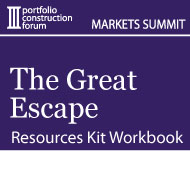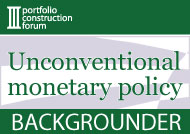|

Markets
Summit 2014- Resources Kit
Unconventional monetary policy -
QE, forward guidance, asset buying - has only been tried a handful of
times over the last century, mostly in the past five years. How and when
will it end? And what does that mean for the markets?
Presented in Sydney, Markets Summit 2014 featured a stellar line-up of
international and local geopolitical specialists, economists,
market/asset class experts, and investment strategists. Each offered a
high conviction idea regarding the impact of Unconventional Monetary
Policy on the medium-term outlook for the global economy, a key market
or asset class - and, of course, the implications for portfolios.
This Markets Summit 2014 Resources Kit will help you understand key
market and asset class opportunities (and risks) - and give you a
baker's dozen of expert, high conviction insights to consider applying when
building portfolios.
|
|
Quicklinks |
|
This online Resources Kit is a key feature of the Market Summit program
(in fact, all our programs feature an online Resources Kit). It enables
all Members (whether or not they were part of the live "studio audience"
on the day) to "attend" Markets Summit. It's an invaluable set of
continuing education material.
This Resources Kit includes all the videos, podcasts and papers from the
live program, along with links to the delegate Workbook, the
Backgrounder "Unconventional Monetary Policy" and key takeouts
Perspectives. |
|
Workbook
Backgrounder
Critical Issues Forum
Asset Class Forum |
Print it and use the checkboxes on the Timetable (pg 5) to tick off
sessions as you "attend";
Read this before "attending" any sessions - it's invaluable assumed
prior knowledge;
The 14-session plenary program featuring 16 leading investment thinkers;
The 5-session elective program featuring 5 leading investment experts;
|
|
Critical Issues Forum |
|
About the Critical Issues Forum |
The Critical
Issues Forum featured leading investment thinkers from around
the world, presenting, in succinct 20-minute presentations,
their high conviction idea regarding the impact of
Unconventional Monetary Policy on the medium-term outlook for
the global economy, a key market or asset class - and, of
course, the implications for portfolios. |
|
Critical Issues Forum 1 |
The Great Escape
PortfolioConstruction Forum Publisher and Conference 2013
Moderator,
Graham Rich, opened Markets Summit in
his usual thought-provoking (and entertaining) way.
|
Resources |
|
Critical Issues Forum 2 |
The unintended consequences of ultra
easy monetary policy
There are at least a dozen ways in which today's long
period of very easy money and very low yields has distorted the
workings of the global financial system. This will cause
unintended consequences in the near future as QE is ended, and
as the funds rate is driven back up from near zero. Many of
these will be adverse consequences.
- Dr Horace "Woody"
Brock, President, Strategic Economic Decisions (New York)
|
Resources |
|
Critical Issues Forum 3 |
QE and navigating the Great Escape
When central banks from around the world united to do whatever
it took to save the world, they launched the mother of all
monetary experiments for which we have no roadmap. The majority
of the world will see an improvement in economic growth this
year - and, equities remain by far and away the most attractive
asset class. But, they will see much greater volatility this
year and require a more nimble approach to asset allocation.
-
Jonathan Pain, Editor, The Pain Report (Sydney)
|
Resources |
|
Critical Issues Forum 4 |
Are the Fed and PBoC ahead of or behind
the curve?
The prospects for a recovery in the world economy rested
squarely on the shoulders of its two biggest economies - the US
and China. The performance of financial markets over the next
few years will depend critically on how well the Fed and PBOC
manage an exodus from their respective, and unsustainable,
policy frameworks. If they prove to be prescient and 'ahead of
the curve', financial markets will flourish; if they dawdle, we
will witness yet another boom and bust cycle that ends in tears.
As long as their policies remain asynchronous modes - the PBOC
tightening and the Fed at zero rates - the one inevitable
byproduct will be a stronger renminbi.
-
Dr Robert Gay, Managing Partner, Fenwick Advisers (New York)
- brought to you by Stratton Street
|
Resources |
|
Critical Issues Forum 5 |
The sweet spot of the global economy
The global economy may be
trying 'The Great Escape' from the many financial crises of the
past years but there is no doubt that some countries are better
placed for this than others. In particular, Australia and New
Zealand have the chance to be among the rock star economies of
the 21st century. With their relatively young populations,
strong primary sectors and geographical location, they have a
chance to avoid the fate of other OECD nations. But are
Australians and Kiwis aware of their good fortunes? Or are they
bound to repeat the mistakes of the Old World?
-
Dr Oliver Hartwich, Executive Director, The New Zealand
Initiative (Wellington)
|
Resources |
|
Critical Issues Forum 6 |
The end of Unconventional Monetary
Policy
Following a half decade of weakness, robust output
growth in the US and UK is setting the stage for unconventional
monetary policies to be unwound and calling into question
forward guidance policies. In the US, the most important factor
in determining the pace of policy normalisation is the evolution
of the labor force participation rate. By contrast, with a
looming hike in the value-added tax and a Bank of Japan Governor
committed to eradicating deflation, Japan is set to ramp up its
unconventional monetary policies in the coming years. The final
verdict on unconventional policies remains years away.
-
David Hale, Founding Chairman, David Hale
Global Economics (Chicago)
- brought to you by RARE Infrastructure
|
Resources |
|
Critical Issues Forum 7 |
Does the end of QE mean the end of the
yield play?
Over the past several years, low beta equities have
disproportionately benefitted from an environment in which
real-interest rates were artificially low, and in many cases
negative. As Central Banks attempt to normalise monetary policy,
real-interest rates are rising and are likely to continue to do
so. This represents a headwind for many segments of the equity
market, most notably the bond market proxies. However, it does
not mean the end of the global hunt for yield, as short-term
rates are likely to remain low for a prolonged period of time.
Investors will still need to source yield, they will simply have
to be more creative on how they do it.
-
Russ Koesterich, CFA, Chief Investment Strategist, BlackRock
(San Francisco)
|
Resources |
|
Critical Issues Forum 8 |
Bonds are a cheap insurance policy
The key differentiator for
bonds compared to any other asset class is that capital price
volatility, as witnessed through 2013, does not equal permanent
loss for the investor. Moreover, losses on bonds offer greater
forward-looking yields for new investments. Consequently, we
should think about bonds as an insurance policy for portfolios.
With higher yields available in diversified bond funds today
than in 2013, very cheap insurance is now even better able to
pay for any hurdles facing portfolios in 2014.
- Robert Mead, MD & Head of Portfolio
Management Australia, PIMCO (Sydney)
|
Resources |
|
Critical Issues Forum 9 |
From liquidity surfing to bull running
As the Fed starts its multi-year monetary policy
normalisation, fixed income’s extended run of high return and
low volatility is coming to an end and will require more active
management. Portfolio rebalancing towards equities, including
emerging markets, is necessary to maintain investment returns,
albeit with greater exposure to volatility. Diversification and
a firm long term investment objective are critical.
- Tai Hui, Chief Market Strategist Asia, JP
Morgan Asset Management (HK)
|
Resources |
|
Critical Issues Forum 10 |
The US recovery will surprise on the
upside
The US is undeniably the
critical market for global investment markets. But many
commentators suggest that while the US is recovering, growth
will remain subdued and the country's best days are in the past.
However, there are real sign-posts that clearly suggest that the
US is off its knees, has dusted itself off and is ready to
surprise the world on the upside! This thesis has significant
implications for investment markets, the unwinding of QE and
portfolio construction.
- Hamish Douglass, CEO & Portfolio Manager,
Magellan Financial Group (Sydney)
|
Resources |
|
Critical Issues Forum 11 |
Quantitative Squeezing –
Differentiation in EM Investing
Emerging Markets were a focal point for major shifts
in the global investment environment in 2013, repricing as the
tailwinds of US stimulus, strong commodity prices and China's
boom subsided. Going forward, we believe the performance of EM
assets will depend to a greater extent on their individual
merits. More than ever, it will pay to differentiate between
asset classes and countries within Emerging Markets.
- Kathryn Koch, Head of the Global Portfolio
Solutions EMEA & Asia ex Japan, Goldman Sachs Asset Management
(London)
|
Resources |
|
Critical Issues Forum 12 |
The Wrong Route to the Right
Destination?
The current environment is so
globally interconnected, leveraged and complex that investors
cannot simply rely on historical reference alone to guide their
journey through this unprecedented situation. Investors must
challenge common assumptions about the US and emerging markets
to ensure they are focusing on the best available routes to the
right destination.
- Ronald Temple, CFA, MD & PM, Lazard Asset
Management (New York)
|
Resources |
|
Critical Issues Forum 13 |
The Great Debate - Investment Advisory
Board Meeting
In this simulated investment
board meeting, our day's presenters debated and voted on two
medium-term critical issues arising from Unconventional Monetary
Policy and the implications for portfolios:
- whether on a two- to three-year view, to favour
Developed Market equities
over Emerging Market equities in portfolios; and,
- whether on a two- to three-year view, to favour short-dated
bonds over
long-dated bonds in portfolios
Delegates took the role of CIO and also voted on each motion.
- Markets Summit 2014 Investment Board
|
Resources |
|
Critical Issues Forum 14 |
The Aquarium Theory of Investing
Normal is
pending; it is not our experience. Today's world is different
from anything in the history of human capitalism, extending
beyond just the escape from unconventional monetary policies.
The Aquarium Theory of Investing is one way to gain perspective
on not just QE's end, but also demographic shifts and
geopolitical uncertainty. Many things once professed good for
capital markets may come to be perceived bad. In such an
environment, one must rely on deductive theory where the past is
not prologue.
- Brian Singer, CFA, Partner & Head of
Dynamic Asset Allocation, William Blair & Co (Chicago)
|
Resources |
|
Asset Class Forum |
|
Asset Class Forum 1 |
Global Bonds
Deploying TAA across credit will be critical as QE unwinds
The Fed has accomplished the
first part of its objective - driving yields down and creating a
wealth effect though higher asset prices. But with asset returns
forecast lower and less evenly distributed, one's ability to
pick inflection points in credit markets as well as deploying tactical
asset allocation will be the key ingredient for 2014.
- Robert Waldner, Chief Strategist & Head of
Multi-Sector, Invesco (Atlanta)
|
Resources |
|
Asset Class Forum 2 |
Australian Equities
Is index investing simply a case of indifference?
The foundation of investing is
to build wealth over time - through growth in the good years,
and preserving capital in the bad. Intuitively, index investing
to build wealth will be harder in a low-growth world, and now
even more so given the backdrop of unwinding QE through
tapering. In a 'Great Escape' world, ignoring the index and
actively seeking growth investments regardless of their size or
weightings is more important than ever. With this in mind, is
index investing simply a case of indifference?
- Alex Milton, Principal & Co-Portfolio
Manager, NovaPort Capital (Sydney)
- brought to you by Fidante Partners
|
Resources |
|
Asset Class Forum 3 |
Multi-Sector
Inflation risk - will QE ruin retirement?
Central banks, led by the
Federal Reserve, are shaping the economic and investment
landscapes. Ultra-low interest rates and Quantitative Easing are
offsetting the deflationary forces of debt deleveraging. The
challenge policy makers face is when to withdraw the stimulus to
avert inflation without choking off the nascent recovery.
Looking back at the risks inflation has presented in the past helps
us look forward at the potential consequences of central bank
policies.
-
Dr Susan Gosling, Head of Investments, MLC (Sydney)
|
Resources |
|
Asset Class Forum 4 |
Asset Allocation
Can Central Bankers negotiate the B.U.M.P. without crashing?
Breaking Unconventional
Monetary Policy (B.U.M.P.) and it's impact on global financial
stability is the key network risk for the foreseeable future.
Its success or failure is critical to the financial system. Like
a spider at the centre of its web, B.U.M.P. touches on sovereign
debt risk, interest rate shock risk, currency instability, and
the global economic state of growth or contraction.
Understanding what may happen next with B.U.M.P. is an essential
pathway to a deeper understanding of portfolio risk management
and making the right risk choices.
- Nicholas Bullman, Founder, CheckRisk
(London)
|
Resources |
|
Asset Class Forum 5 |
Asset Allocation
There will be no Great Escape without a Great Unwind
To achieve the Great Escape, central banks must first
complete the Great Unwind – the removal of ultra-easy monetary
policies. The roadmap for the Great Unwind includes examining
why inflation has not picked up despite the massive increase in
money supply (and it's not because the banks won't lend the
money), what impacts tapering will have on interest rates and
equities, and why the critical period for markets will come when
the Fed lifts short-term interest rates – probably, but not
necessarily, after tapering finishes.
-
Tim Farrelly, Principal, farrelly's Investment Strategy (Sydney)
|
Resources
|
|
|




